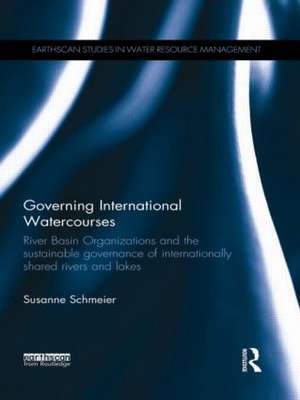Governing International Watercourses: River Basin Organizations and the Sustainable Governance of Internationally Shared Rivers and Lakes: Earthscan Studies in Water Resource Management
Autor Susanne Schmeieren Limba Engleză Paperback – 22 mai 2015
| Toate formatele și edițiile | Preț | Express |
|---|---|---|
| Paperback (1) | 491.82 lei 6-8 săpt. | |
| Taylor & Francis – 22 mai 2015 | 491.82 lei 6-8 săpt. | |
| Hardback (1) | 1068.18 lei 6-8 săpt. | |
| Taylor & Francis – 30 noi 2012 | 1068.18 lei 6-8 săpt. |
Din seria Earthscan Studies in Water Resource Management
-
 Preț: 371.13 lei
Preț: 371.13 lei -
 Preț: 326.49 lei
Preț: 326.49 lei -
 Preț: 311.39 lei
Preț: 311.39 lei -
 Preț: 155.43 lei
Preț: 155.43 lei - 8%
 Preț: 389.09 lei
Preț: 389.09 lei -
 Preț: 310.12 lei
Preț: 310.12 lei -
 Preț: 256.02 lei
Preț: 256.02 lei -
 Preț: 312.20 lei
Preț: 312.20 lei -
 Preț: 279.32 lei
Preț: 279.32 lei -
 Preț: 326.26 lei
Preț: 326.26 lei -
 Preț: 470.90 lei
Preț: 470.90 lei - 18%
 Preț: 1060.25 lei
Preț: 1060.25 lei - 10%
 Preț: 311.38 lei
Preț: 311.38 lei - 18%
 Preț: 1000.27 lei
Preț: 1000.27 lei -
 Preț: 479.19 lei
Preț: 479.19 lei -
 Preț: 442.68 lei
Preț: 442.68 lei - 18%
 Preț: 1000.27 lei
Preț: 1000.27 lei - 18%
 Preț: 1056.32 lei
Preț: 1056.32 lei - 18%
 Preț: 1054.71 lei
Preț: 1054.71 lei - 18%
 Preț: 1064.70 lei
Preț: 1064.70 lei - 18%
 Preț: 1001.84 lei
Preț: 1001.84 lei - 18%
 Preț: 1051.55 lei
Preț: 1051.55 lei - 25%
 Preț: 767.07 lei
Preț: 767.07 lei - 18%
 Preț: 1002.80 lei
Preț: 1002.80 lei - 18%
 Preț: 1056.00 lei
Preț: 1056.00 lei -
 Preț: 469.34 lei
Preț: 469.34 lei - 18%
 Preț: 1173.90 lei
Preț: 1173.90 lei -
 Preț: 485.46 lei
Preț: 485.46 lei - 18%
 Preț: 1009.74 lei
Preț: 1009.74 lei - 26%
 Preț: 762.57 lei
Preț: 762.57 lei - 26%
 Preț: 764.20 lei
Preț: 764.20 lei - 12%
 Preț: 312.43 lei
Preț: 312.43 lei - 18%
 Preț: 730.71 lei
Preț: 730.71 lei - 12%
 Preț: 325.34 lei
Preț: 325.34 lei - 31%
 Preț: 765.36 lei
Preț: 765.36 lei -
 Preț: 409.31 lei
Preț: 409.31 lei -
 Preț: 416.22 lei
Preț: 416.22 lei -
 Preț: 483.49 lei
Preț: 483.49 lei - 18%
 Preț: 1001.84 lei
Preț: 1001.84 lei
Preț: 491.82 lei
Nou
94.11€ • 98.26$ • 77.89£
Carte tipărită la comandă
Livrare economică 04-18 aprilie
Specificații
ISBN-10: 1138900508
Pagini: 368
Dimensiuni: 156 x 234 x 31 mm
Greutate: 0.51 kg
Ediția:1
Editura: Taylor & Francis
Colecția Routledge
Seria Earthscan Studies in Water Resource Management
Locul publicării:Oxford, United Kingdom
Public țintă
PostgraduateCuprins
Recenzii
"Transboundary waters can be a catalyst for cooperation if certain enabling factors exist. Dr. Schmeier´s book is an important contribution to the ongoing scientific discussion on the management of natural resources in international river basins, with a particular focus on enabling factors for effective cooperation. It is also a unique knowledge base for practitioners responsible for elaborating, improving or implementing institutional arrangements for cooperation. Its immense value lies in the lessons learned from practical cases, presented in a structured analysis of existing River Basin Organizations as well as the brilliantly elaborated principles for good governance of RBOs, ultimately contributing to cooperative sustainable development of river basin for the benefit of all riparian countries." - Fritz Holzwarth, Former German Water and Marine Director, Former President of the Danube-, Rhine- and Elbe River Protection Commissions
Notă biografică
Susanne Schmeier has worked with a number of River Basin Organizations, international organizations and bilateral donors in the field of transboundary river basins, among them the German Gesellschaft fur Internationale Zusammenarbeit (GIZ) and the Mekong River Commission. She holds a PhD from the Berlin Graduate School for Transnational Studies (BTS), a joint endeavour of the Hertie School of Governance, the Social Science Research Centre Berlin (WZB) and the Freie Universitat Berlin.
Descriere
This book focuses on River Basin Organizations as the key institutions for managing internationally shared water resources. This includes a comparative analysis of all River Basin Organizations worldwide and three in-depth case studies from three different continents. The detailed case studies are the Senegal (West Africa), Mekong (South-east Asia) and Danube (Europe) rivers. The book contributes to the academic debate on how shared natural and environmental resources can be managed in a sustainable way and which institutional and legal mechanisms actually matter for doing so. It adopts the neo-institutionalist approach, according to which international environmental institutions do make a difference. The analysis not only confirms this argument for the specific case of shared water resources, but also refines existing hypotheses on the influence of different independent variables, namely the nature of the collective action problem, the constellation of actors and the institutional design of an international environmental institution. The work also contributes to the policy debate on how to better govern internationally shared natural resources and the environment.It provides policy makers with advice on which exogenous conditions to be aware of when managing water resources they share with co-riparians and which institutional design features and governance mechanisms to set up in order to increase effectiveness in management.






























